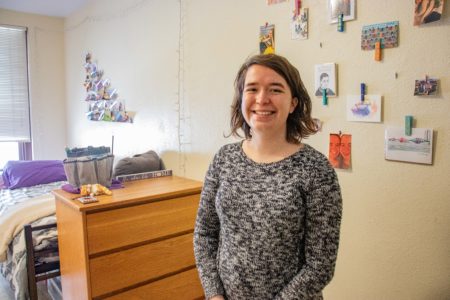Community Advisors (CAs) have a job that sets them apart from other employment opportunities in the Grinnell College community. CAs serve to help students address their concerns and, if they cannot, guide them to a resource on campus who can. They also create bulletin boards and door decorations, host programs for their halls and have an on-call rotation each weekend where the student serves as an on-campus resource. CAs also have staff meetings with administrative tasks, in which they discuss how walk-throughs are going or any concerns with residents.
Another job requirement is undergoing training before each semester starts. This comprehensive training spans multiple days to ensure that CAs are adequately prepared to handle any scenario that may arise. One aspect of training is the Behind Closed Doors. These scenarios are created and acted out by Community Advisor Mentors, the students who are often the go-between for Residence Life staff and Community Advisors. These roleplaying exercises aim to prepare students for any possible situations that either have occurred in the past or may come up in the future.
While there are requirements that all CAs must adhere to, much of the job is handling unexpected scenarios with residents that one cannot always anticipate. Additionally, this role does not have set hours; students do not “clock in” for work, unlike every other campus job. Because CAs are always in work mode, it can be hard to separate work and personal life. “Something I like about training is that there’s no real way to prepare you for being a CA. The amount of situations that can come up are infinite; you can’t deal with everything. But training gives you the ability to — for the vast majority of situations — say either ‘I can do this’ or ‘I can’t do this, but I know someone who can,’” said Jasper Egge ’20, a CA for the first floor and half of the second floor of Kershaw in East Campus.
Because CAs work so closely with their residents and never truly are off duty, it can be difficult to find a work life balance. Additionally, this job can involve a lot of emotional labor that can be hard to manage.
“I live where I work, I’m never not a CA. Because I’m always in a place where my residents can see me, whether that’s at Harris or High Street or in the Grill doing homework, I can have a resident come up and say ‘hey I need your time right now’ sort of, whenever,” said Leah Johnson ’19, Community Advisor Mentor for the CaNaDa cluster and a CA for Norris first and the Cowles Apartments.
The workload across campus is not uniform; some dorms may require more work for CAs than others. The emotional labor required of a CA may not be consistent either, making it so the job can be demanding and incredibly personal.
“We are technically paid for 16 hours a week for work, and I don’t think I could ever say ‘yes, I consistently work 16 hours.’ But some weeks I will do the emotional labor of 20 hours and some weeks I will do four. And that just happens,” explained Dani Evans-Schreiber ’19, a CA for Read second and third floors in South Campus.
It can be hard to strike the balance between CA work and personal life. CAs are invested in the well-being of their residents, but sometimes they can take on too much. “We’re not therapists, which is sometimes a hard thing to get into our minds and sometimes residents’ minds as well,” added Evans-Schreiber.
Despite the demands that this role can ask of students, CAs continue to serve in this position because they love their work. CAs form bonds with their residents and have a unique connection to the Grinnell College campus community.
“It’s always for my residents, even though I know they’re changing every year. I want to help them, and I want to make sure that they are doing okay and people are doing okay. It’s worthwhile, for people, for helping people,” said Evans-Schreiber.

Photo by Sarina Lincoln.


































































